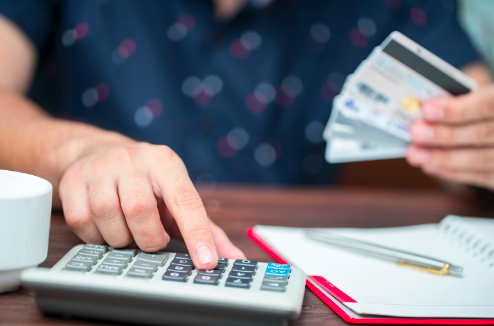Financial Problem, me? No. We usually don’t see it. In this post, we will give you 10 signs that you have a financial problem, so that once you have identified it, you can take the necessary steps to fix it.
Please note that this post may contain affiliate links. This means that I may earn a commission if you make a purchase through those links at no extra cost to you. I only recommend products or services that I have personally used and believe will provide value to my readers. Your support through these links is greatly appreciated and helps me continue to provide valuable content. Thank you for your support!”
Reading Jim Rohn’s Books, he stressed the importance of setting goals as a key factor to succeed in life. One goal he recommends is to become financially independent. Almost every book/speech I’ve heard from him, he repeats at every opportunity how he was able to go from creditors calling every day to being a millionaire, and the key to that was setting goals.
Ask yourself the following questions:
- Have you ever gone to a mall or supermarket and been unable to purchase something you need? Not something you want, something you need.
- Have you maxed out all of your credit cards, to the point where you do not remember which one you can use?
- Are you used to being short on cash, anxiously awaiting your paycheck, or relying heavily on credit cards?
If you answered Yes to some or all of these questions you might have a financial problem. Not only that, your are probably broke.
Understanding the fact that you might be broke is an important part of helping you get back on track. These are uncomfortable feelings that do not allow you to live happily. Usually, financial problems stem from bad habit. However, the biggest and hardest part of changing a bad habit is realizing you have one. Bad financial habits lead to financial problems. Recognizing you have one is like acknowledging you have a drug addiction; it only happens when you hit a wall.
So, if you are approaching that wall, here are 10 signs that you have a financial problem that will guide you through the steps to change them:
Not having enough cash at the begging of the month
Running out of cash right after receiving your paycheck should signal that you have a budgetary problem. This could be an issue that is fixed with budgeting habits but could also be a prelude to a bigger problem, such as a spending addiction. Your income should be enough to last an entire month and cover the necessary payments and expenses. If this is not the case, you need to reorganize your lifestyle to adjust to your reality.
Using credit cards too much for normal living expenses

Credit cards can have many benefits and could be used for good debt management. However, the cash illusion credit cards create can be as deadly as a mirage in the desert. If you cannot pay for your credit card spending with your income, then you are overusing it. If you do this repeatedly, you will end up with too much debt.
Remember that debt is money spend today that you have yet to produce.
The key is to learn to measure how much you can consume today without harming your future plans and activities. Three tips that work for me in reducing credit card spending:
- Lower my credit card limits
- Hide them in my house so that I do not use them for regular purchases like groceries or gas (it works)
- Review my card statement for a year and see how much I paid in interest and fees. Believe me, it was equivalent to a monthly salary.
Seclusion from social meetings
Humans are social individuals. Social interactions are good for self-esteem, attitude, and human connection. When we deprive ourselves of these activities, it makes us more negative and depressed. This state will empower negative and compulsive behavior.
If you find yourself saying “no” to every social activity because you feel you cannot afford it, this should indicate that some changes need to be made. Perhaps you need to reorganize how you pay off your debts or how you live a budget-conscious life. In both scenarios, you need to include some form of social interactions. Additionally, there are ways to have social meetings without spending too much or as much as you used to.
Making a fight out of everything, especially if it has to do with money
Almost everything we do involves money. To go to work, we have to pay for transportation; to eat, we have to pay for food; even to rest, you have to pay rent or a mortgage. When your cash flow is not enough, you tend to worry about everything. For small expenses, you start arguing or shouting at friends and family. This behavior usually indicates that you are not free to do, go, or purchase things you like that are, in reality, not that expensive. As a result, your worry is expressed negatively toward others.
Not paying bills every month or intercalating payments
A quick fix is usually a bad solution. If stopping payment on necessary bills is required to have some extra cash, you have a money problem. This should alert you to the need to change your spending habits. In reality, you are disguising a problem, not creating a solution.
Your monthly necessary cash flow payment overpasses your inflows
This is why you use your credit cards too much. If you create a personal cash flow statement, it will show that you have negative cash flow. If this is your case, you need to make changes to your lifestyle immediately. Continuing with this habit will never benefit you.
Not having enough money to fulfill your goals

Most goals and dreams in life have a price tag attached. Purchasing your first home, starting a business, or going on a trip to Europe all require money-saving techniques. Coming to terms with the fact that you might not be able to do what you want can be a harsh reality to face. This realization should suggest that you need to make a change. Do not despair; change can happen if you work at it.
Checking your online bank accounts too often
Do you check your online account every time you want to use it or just to see how much money you have? This behavior may be an indirect sign that you need to be careful with your spending, simply because you do not have enough.
Not having enough cash to save at least US$10 a month
Every year, I have a rule to wear something new for New Year’s Eve. To ensure I can do that, I save at least US$10 a month. Make a list of your expenses. If you cannot save US$10 a month, you have a problem. This means you are unable to generate enough cash to save 0.33 cents per day in a month.
Not having financial options to cover for emergencies

One thing is not having cash at hand to cover emergencies, and another is not even having a financial backup plan to cover emergencies. This should signal a real problem for anyone because one of the benefits of debt is to help you with emergencies that you could not otherwise fix.
Closing thoughts
These 10 signs will help you realized that you have a financial problem. However, the world has not reached to an end. YOU can come out of it.
Recognizing the signs of a financial problem is the first step towards overcoming it. While facing financial challenges may seem daunting, taking proactive steps to address these issues can lead to a path of financial stability and freedom. Remember, it’s never too late to make positive changes in your financial habits and work towards a brighter financial future.
By identifying and addressing these warning signs early on, you can pave the way for a more secure and prosperous tomorrow. Stay diligent, stay committed, and remember that with dedication and effort, you can break free from financial struggles and build a solid foundation for financial success.
